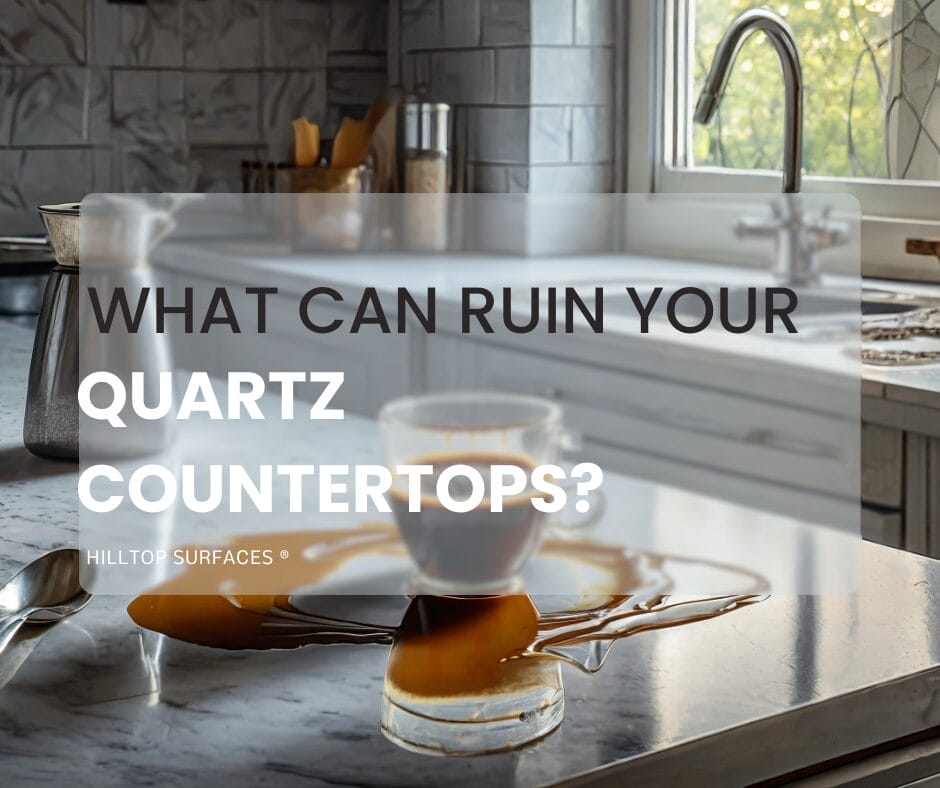How to Choose the Best Quartz Kitchen Countertops?
Choosing the right kitchen countertop is crucial for your kitchen’s look and function. It’s not just about aesthetics, the material you choose must be durable, resist stains, and be easy to maintain. Making a thoughtful choice can significantly enhance your kitchen’s practicality and style.
Quartz Kitchen Countertops have gained popularity due to their durability and low maintenance. Made from engineered stone, quartz countertops resist scratches, stains, and heat, making them a practical choice for busy kitchens. They are available in different colors and patterns and allow homeowners to find the perfect match for their kitchen design. With their blend of beauty and resilience, quartz countertops are a top choice for those seeking a long-lasting and elegant kitchen surface.
This blog guides you on selecting the best quartz kitchen countertops by exploring various styles, colors, and durability features. Learn how to choose the perfect countertop that complements your kitchen space.
What Are Quartz Kitchen Countertops?
Quartz kitchen countertops are made from engineered stone. This material is created by blending about 90–95% ground quartz with – 5-10% polymers, resins, and pigments. This process produces a highly durable, non-porous surface that resists stains, scratches, and heat. The engineered nature of quartz allows for a wide range of colors and patterns that closely resemble natural stone. This versatility makes quartz a perfect choice for homeowners looking for a countertop that combines style and function.

Quartz Kitchen Countertops
Benefits of Quartz Countertops
Durability
Quartz is made from a mix of crushed quartz and resin, which makes them resistant to scratches, and cracks. This means they can handle daily activities like chopping vegetables or placing heavy pots without getting damaged.
Aesthetic Appeal
Because these Countertops are made from engineered stone, they offer uniform color and pattern throughout, giving your kitchen a sleek, seamless look. With quartz, you can get exactly the look you want. Quartz Countertops come in multiple colors and patterns, including options that mimic natural stones. This allows you to select a style that perfectly complements your kitchen’s design.
Non-Porous Surface
Unlike Natural Stones, quartz countertops don’t absorb liquids. This is because they are non-porous, meaning spills from coffee, wine, or juice will stay on the surface and are easy to clean up. It also prevents bacteria and mold from growing on the countertop, making it more hygienic.
Low Maintenance
Quartz is very easy to clean and maintain. You don’t need to apply a special sealant to protect it like granite. Just wipe it with a mild soap and water regularly, and it will stay clean and fresh.
Heat and Stain Resistance
Quartz Countertops can resist stains and handle heat as well. However, you can use trivets for hot pots to avoid potential damage. They can also withstand spills from foods and drinks without staining.
Strength
Quartz Countertops are strong and durable. Quartz scores 7 out of 10 on the Mohs Hardness Scale. This makes them less likely to crack, even with heavy use.
Key Factors to Consider When Choosing Quartz Kitchen Countertops
Quartz kitchen countertops are known for their durability and easy maintenance. When choosing the right quartz kitchen countertop material, it’s important to consider how it will fit into your kitchen’s overall style. Quartz Countertops Colors and their finishes play a crucial role in choosing the right countertop for your kitchen:
1.Popular Quartz Countertop Colors
White Quartz: White Quartz Countertop colors provide a clean, timeless look that brightens any kitchen. It works well with different cabinet colors and styles. Hilltop Surfaces’ Mars Quartz range that includes Bianco Classic and Mars Calacatta Ice Quartz fall in this category.
Grey Quartz: Grey is a neutral, versatile option that suits different design styles. It can add a subtle, contemporary touch to your kitchen. Some eminent examples include Mars Space Grey Quartz Mars Gris Neve Quartz and Mars Elegant Gris Quartz.
Black Quartz: Black quartz adds a bold, sophisticated element to your kitchen. It works especially well in larger spaces. When paired with lighter cabinets it creates a striking contrast. Mars Space Black Quartz and Mars Nero Venato Quartz from Hilltop Surfaces’ Mars Quartz collection are a few examples of this countertop material.
Blue Quartz: Blue quartz offers a unique and stylish option. It brings a refreshing, cool tone to the kitchen.
Taupe Quartz: Taupe quartz offers warmth with its earthy tones, making the kitchen feel cozy and inviting. It’s a great choice for creating a neutral, balanced environment.
Brown Quartz: Brown quartz provides a rich, natural look that complements wood cabinetry and other elements in the kitchen.
2.Popular Quartz Countertop Finishes
When choosing kitchen Countertop Materials its finish is as important as the color. The finish influences the appearance, feel, and functionality of the countertops. Different finishes can give your kitchen a unique look, whether you prefer a high-gloss shine or a more subtle texture.
Polished Finish: The most common finish, polished quartz, has a glossy, reflective surface that enhances the stone’s color and pattern. It gives the kitchen a sleek, modern look and is easy to clean.
Matte Finish: Matte quartz countertops lack the glossy, shiny appearance of most countertops. Instead, they offer a smooth finish that doesn’t reflect light. It’s perfect for a more understated and contemporary appearance.
Honed Finish: A honed finish provides a matte or satin-like surface with minimal or no reflection. This finish is ideal for creating a more natural, relaxed ambiance in the kitchen.
Leathered Finish: The leathered finish has a textured surface that adds depth and character to the countertop. The leathered texture is created by brushing the quartz surface to give it a slightly uneven, matte look, adding a blend of sophistication and rustic charm to your kitchen.
Glossy Finish: A glossy finish is highly reflective, similar to the polished finish but with a more intense shine. It’s great for adding a luxurious touch to the kitchen.
3.Size and Shape of Your Countertops
Measuring Your Kitchen Space
Accurate measurements are crucial when choosing quartz countertops. Start by measuring the length and width of your countertop areas, including any islands or breakfast bars. Also, check the height to ensure it aligns with your cabinets and appliances.
Choosing the Right Shape for Functionality and Design
The shape of your quartz kitchen countertops should enhance both functionality and design. Standard rectangular or square shapes work well in most kitchens. You can also consider L-shaped or U-shaped countertops to maximize your storage space and kitchen’s visual appeal.
4.Price and Budget Considerations
Average Costs of Quartz Kitchen Countertops
The cost of these countertop materials varies based on several factors. It depends on the quality, brand, and design of the quartz. Higher-end options with unique patterns or custom colors can cost more, while standard choices are more budget-friendly.
Factors That Influence Pricing
Several factors can influence the price of quartz countertop materials. These include the thickness of the slab, which can affect durability and cost, and the complexity of the installation, which may involve additional labor or customization. Patterns and colors also play a role; more intricate designs or rare colors generally come at a premium cost.
Maintenance and Care for Quartz Kitchen Countertops
Cleaning and Maintenance
Use a mild dish soap mixed with warm water and a soft cloth or sponge for regular cleaning. Avoid harsh chemicals or abrasive scrubbers that can damage the surface. Always use trivets or hot pads to protect the surface from direct heat.
Long-Term Care Tips
Though quartz is resistant to staining, it’s always a great idea to clean spills as soon as they occur. Avoid cutting directly on the countertop to prevent scratches and use cutting boards for food preparation. Regular maintenance involves routine cleaning and immediate attention to spills. Avoid heavy impacts that could damage the surface. To maintain the countertop’s appearance, consider using a soft cloth for cleaning and avoid abrasive tools.
Conclusion:
Choosing the best quartz kitchen countertops involves balancing personal needs with design preferences. Consider how the countertop will fit into your kitchen’s style, functionality, and daily use. Consider factors like durability, maintenance, and cost to find a suitable countertop that suits your lifestyle and aesthetic goals. By assessing your specific requirements and preferences, you can select a countertop that not only enhances your kitchen’s appearance but also keeps your kitchen beautiful and functional for years.














